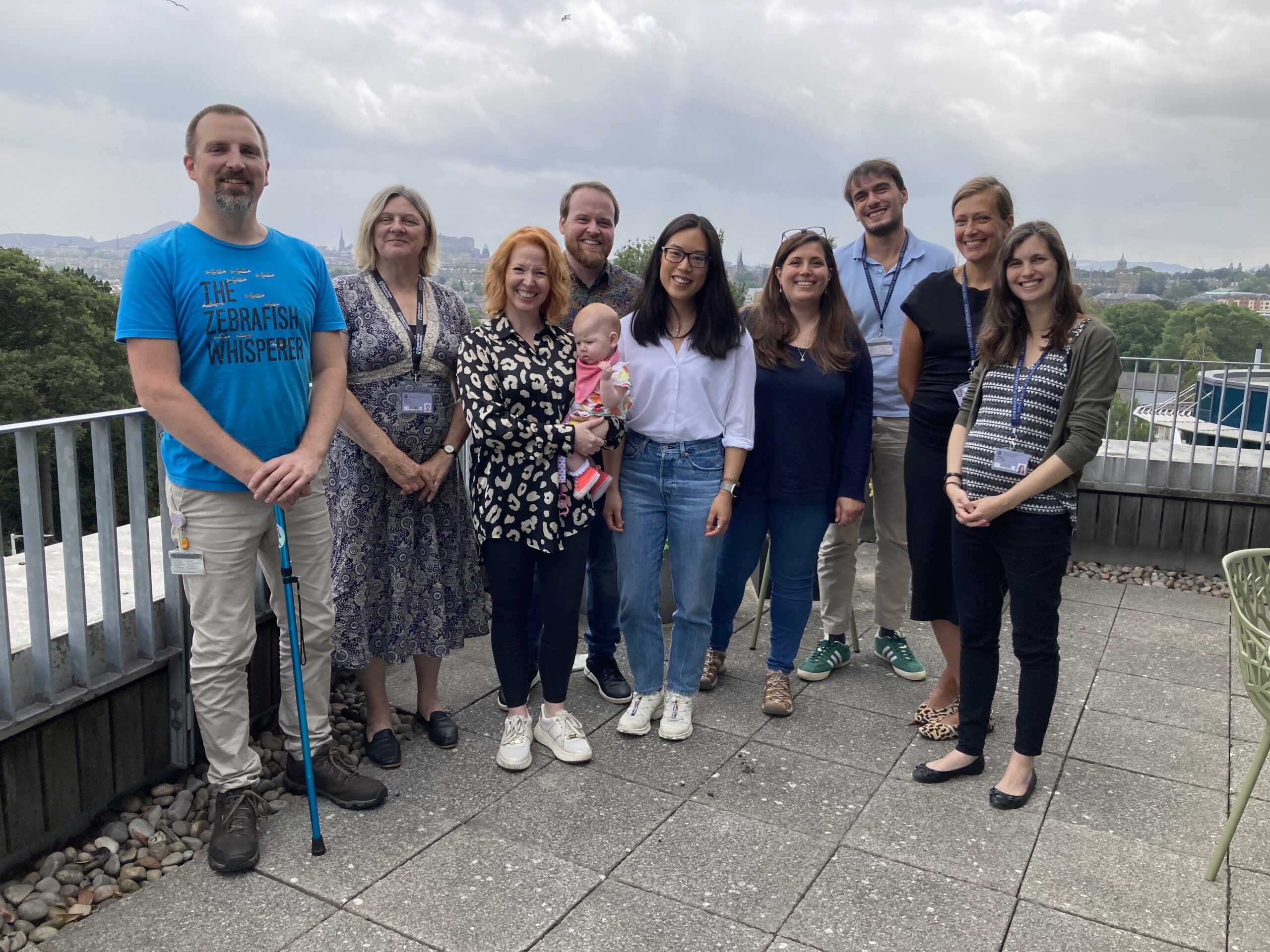Kabuki Syndrome Foundation visits IGC to learn about research into chromatinopathies

By Jessica McAndrew, Kabuki Syndrome Foundation (KSF) Board Member (originally posted on the Kabuki Syndrome Foundation page)
The Kabuki Syndrome Foundation (KSF) was honoured to visit the Medical Research Council’s Human Genetics Unit (HGU) at the Institute of Genetics and Cancer, University of Edinburgh, one of the UK’s leading centres for research into the fundamental mechanisms of chromatinopathies such as Kabuki syndrome.
The visit was personally arranged by Professor Wendy Bickmore, Director of the MRC Human Genetics Unit, after hearing KSF Board Member Jessica McAndrew — mum to Aidan, who has Kabuki syndrome — speak at the Manchester Rare Conditions Centre’s second anniversary event in 2024. It was an opportunity to connect basic science with lived experience—and to learn how research into chromatin biology could impact future progress for Kabuki syndrome and related conditions.
Kabuki syndrome is caused by mutations in genes that regulate chromatin, the complex of DNA and proteins that packages our genetic material into the cell nucleus. Chromatin’s structure is critical: it determines which genes are switched on or off, and when. When the genes that regulate chromatin don’t work properly, it can lead to a group of rare, and still poorly understood, conditions known as chromatinopathies.
Professor Bickmore opened the day by sharing her team’s work on the 3D structure of the genome – how DNA folds inside the cell nucleus and how this folding controls which genes are active. She emphasised the importance of basic science research in understanding how mutations in chromatin regulators, like those seen in Kabuki syndrome, can disrupt this organisation and cause disease. Her current research efforts are aimed at identifying enhancers and promoters (key DNA control regions) that are relevant to chromatinopathies. The team is combining computational modelling and lab-based experiments to understand the impact of mutations.
The visit continued with a presentation from Dr Carolina Uggenti on Aicardi-Goutières syndrome. Her work explores dysfunction in the cGAS-STING pathway, a part of the innate immune system that can trigger programmed cell death when the nuclear envelope is disrupted. This pathway is also of interest in Kabuki syndrome, where research by KSF Medical and Scientific Advisory Board member Dr. Alessio Zippo has identified persistent nuclear envelope rupture and cGAS-STING pathway activation as key mechanisms in Kabuki syndrome.
Researchers are also exploring what future treatments could look like. With gene therapy increasingly making headlines, it was especially interesting to hear from Dr Rebekah Tillotson, who shared how techniques originally developed for Rett syndrome are now being applied to ATR-X syndrome, another chromatinopathy also linked to cGAS-STING signalling. Her team is exploring ways to identify ‘mini-genes’ from large genes so they can fit into delivery vectors, a major technical challenge for many gene therapies. This type of work could one day inform treatment strategies for conditions like Kabuki syndrome.
Professor Pleasantine Mill then introduced a UK-wide initiative to interpret Variants of Uncertain Significance (VUS) and highlighted how the Rare Disease Research UK network is fostering collaboration across centres to accelerate diagnosis. Such initiatives open up promising opportunities for future Kabuki-focused research and improved diagnostic tools across rare diseases.
Our visit concluded with a tour of the zebrafish facility, where Dr Cameron Wyatt explained how these animals are used to model rare diseases. Zebrafish with KMT2D mutations are already being used by researchers such as Dr Angie Serrano to study early development processes. Meanwhile, KSF’s 2025 research grant to Dr David Geneviève and collaborators uses a zebrafish model of Kabuki syndrome to explore gene activation strategies using dCas9 technology, advancing therapeutic research with real translational potential.
KSF’s Director of Research, Dr Clara Tang, who also attended the visit, reflected on the day: “It was a valuable opportunity to see how fundamental research is being applied to better understand rare diseases. Several of the approaches and pathways discussed—particularly those involving chromatin regulation and innate immune signalling—are directly relevant to Kabuki syndrome. Cross-disciplinary collaboration like this is essential for accelerating progress in rare disease.”
Our visit to the MRC Human Genetics Unit was a powerful reminder of how much shared ground exists across rare diseases — and how research into one condition can spark advances in many others. The Kabuki Syndrome Foundation is proud to contribute to this broader landscape, both by representing our community in key scientific spaces and by supporting research that has global and cross-disciplinary impact. We’re grateful to Professor Bickmore and her team for the warm welcome, and excited by the momentum building across the UK and beyond to better understand, and ultimately treat, chromatinopathies like Kabuki syndrome.





